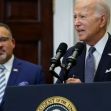The Biden administration campaigned heavily on student loan forgiveness. While these campaign promises have not yet come to fruition, the administration has announced the largest one-time debt cancellation ever made by the Department of Education. This massive discharge will total $5.8 billion and will impact roughly 560,000 borrowers.
Unlike the calls to cancel student debt for borrowers across the nation, this one-time discharge will impact borrowers who attended one of the many for-profit schools that operated under Corinthian Colleges. But what exactly are Corinthian Colleges, who qualifies for this massive debt relief, and what does it mean for the national debate surrounding student debt forgiveness?
Who Qualifies for the Corinthian College Loan Forgiveness?
The borrowers who will qualify for this unprecedented debt relief include students who attended any of the Corinthian Colleges between the time of its founding in 1995 to the time it closed in April 2015.
Corinthian Colleges consist of a number of for-profit universities that were based throughout the nation. They include what grew to be recognizable names such as Everett Institute, Everett University Online, Heald, and WyoTech. Corinthian Colleges also acquired several educational institutes as well.
The post-secondary education model offered by Corinthian served as an alternative to individuals who wanted to pursue higher education but could not afford it. Classes they offered included diploma and degree programs concentrated in healthcare, criminal justice, information technology, and other industry-leading trades. According to the Department of Education, at its peak operation, Corinthian operated 105 campuses and enrolled over 110,000 students.
Any student with a balance due to Corinthians will be notified of their student loan status. In some cases, students who attended Corinthian Colleges will also receive a refund for any payments that they made to their university.
Students who are eligible for loan forgiveness or reimbursement will be notified by the Department of Education and do not have to take any action to qualify for the relief.
The sweeping relief comes after a years-long endeavor to hold the for-profit college business model accountable for falsely marketing its classes to vulnerable populations. In 2013, Vice President Kamala Harris was serving as the Attorney General of California when she filed a lawsuit against Corinthian Colleges. The lawsuit accused Corinthian of misrepresenting its job placement rates and using recruitment methods that targeted vulnerable students. These students would ultimately take out thousands in student loans only to be unable to find a job in their career field that would help them pay back those loans.
For many students who went through the Corinthian Colleges education path, they completed their program only to receive a Corinthian degree that did not hold weight in the job market. The majority of the campuses were not accredited, and despite advertisements that students would be able further their education, many of the credits received in a Corinthian Colleges program were not transferable. As a result of Harris' 2013 lawsuit, then-Attorney General Harris was able to secure a judgment that gave way to $1.1 billion in relief for former students.
This latest massive debt cancellation comes as a result of the borrower defense program. This federal initiative allows students who are able to prove that their school defrauded them to have their student debt canceled.
What Does This Move Mean for the Future of Student Loan Relief?
This much-welcomed announcement by the Biden administration has left many wondering how the move will impact further discussions about wiping away student loans for borrowers who are struggling to pay them back.
According to the Education Data Initiative, there is roughly $1.76 to trillion in student loan debt throughout the United States. A majority of this debt, just over 91% of it, is from a federal loan with the average federal loan debt balance being $37,014.
While this staggering student debt number is impacting borrowers long after they've left college, there are roughly 43.4 million borrowers, just 12.9% of the population who owe money on their education. Despite this being a sliver of the population, the fierce cry for the Biden Administration to extend student loan forgiveness continues to grow among young adults who cannot seem to find a way out from under their debt. For many borrowers, their student loan balance has kept them from being able to move forward with life milestones including purchasing a home and starting a family.
Before Biden’s election, and shortly after his inauguration, murmurs of student debt cancellation have been at the forefront of national discussion. Biden has outright rejected a $50,000 forgiveness for borrowers but has toyed with the potential forgiveness of $10,000 per borrower.
This latest measure to wipe out the student debt of those who attended Corinthian Colleges does not measure up to the need or merit of borrowers who attended other universities. Unlike students who took out loans to go to four-year colleges or graduate school, those who attended Corinthian Colleges were misled into signing up for programs that ultimately failed them.
This is a stark difference from the average college graduate who goes on to see an average of $32,000 more per year because of their degree as compared to an individual who only has a high school diploma.
Although there are rumors that President Biden will announce a $10,000 debt relief measure for all borrowers, regardless of where they went to school, no substantial policy or initiative has been brought forward yet.
While the discharge of student debt relief for students who attended Corinthian Colleges proves to be a sigh of relief for those borrowers, it likely won't impact the greater discussion of student debt nationwide.






